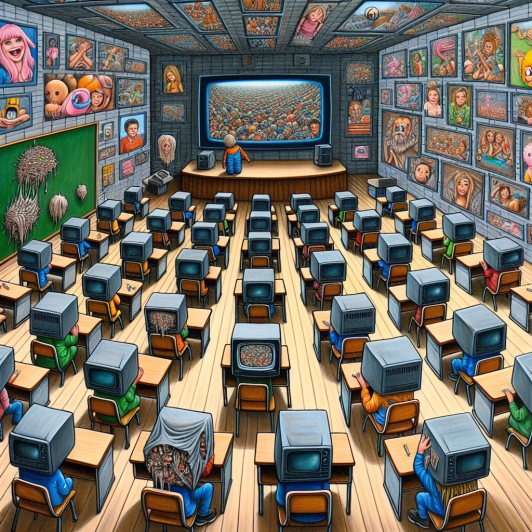
Why Is the US Education System So Bad: It on Par With Trash
Updated May 3, 2024
While the United States education system undoubtedly has its merits, it is equally essential to scrutinize its darker aspects, offering a critical evaluation of the issues that plague it.
One glaring issue is the vast educational inequality in the United States. According to a report by the National Center for Education Statistics, students in underfunded schools often receive an education markedly different from those in affluent districts. This disparity in resources, experienced teachers, and access to quality programs perpetuates a cycle of inequality, hindering the opportunities available to disadvantaged students. For example, a study conducted by the Education Trust found that high-poverty schools tend to have less experienced and qualified teachers, resulting in lower academic performance among students.
Standardized testing, a prominent feature of the US education system, has come under fire for its adverse effects. Critics argue that overemphasizing standardized tests narrows the curriculum, forces educators to “teach to the test,” and may not accurately reflect a student’s true abilities. Moreover, this system can lead to an unhealthy obsession with test scores, promoting a culture of stress and anxiety among students. Research conducted by the National Education Association has shown that high-stakes testing can negatively impact student motivation, well-being, and creativity. For instance, a study published in the Journal of Applied School Psychology found that increased testing pressure was associated with higher levels of student anxiety.
The American education system’s focus on competition can also have detrimental consequences. Schools often compete for funding, leading to a hyper-focus on test results and neglecting comprehensive, well-rounded education. This competitive atmosphere may also discourage collaboration among schools and educators, hindering the sharing of best practices. A prime example is the narrowing of the curriculum, with subjects such as arts, music, and physical education being deprioritized in favour of subjects that contribute to higher test scores. According to a report by the Center on Education Policy, this narrowing has been particularly notable in schools with low-income students.
Furthermore, the U.S. education system’s approach to addressing students’ mental health and well-being has been criticized. In some instances, the pressure to excel academically may overshadow the importance of nurturing students’ emotional and psychological health, potentially contributing to a mental health crisis among young people. The National Alliance on Mental Illness reports that approximately 20% of children and adolescents in the United States experience a mental health disorder. However, the lack of comprehensive mental health support in schools exacerbates the problem. For example, a study published in the Journal of School Health found that only 39% of schools in the United States have access to a full-time school nurse, limiting the availability of mental health resources for students.
Another contentious issue is the cost of higher education in the United States. Skyrocketing tuition fees and student loan debt have left many graduates burdened with substantial financial obligations, impacting their financial well-being for years to come. According to the College Board, the average cost of tuition and fees at public four-year institutions increased by 212% between 1998 and 2018. As a result, students often find themselves trapped in a cycle of debt, inhibiting their ability to pursue career opportunities, purchase homes, or save for retirement. A study conducted by the Brookings Institution found that the average student loan debt for bachelor’s degree recipients in the United States is around $30,000.
A harsh but critical review of the US education system reveals significant flaws. These include deep-seated inequalities, the pitfalls of standardized testing, a hyper-competitive culture, inadequate attention to students’ mental health, and the financial challenges associated with higher education. Recognizing and addressing these issues is crucial for improving the system and ensuring equitable student opportunities. We can only create an education system that fosters creativity and critical thinking and empowers students to reach their full potential through comprehensive reforms and a collective commitment to change.
The Detrimental Role of Media and Corporations
The detrimental role of media and corporations in the American education system is a significant concern. Social media and reality TV have a profound impact on societal values and intellectual engagement. They prioritize engagement and instant gratification over quality, hindering the development of critical thinking and intellect. This issue is reinforced by corporations’ exploitation of these platforms to shape consumer behaviour and opinions through targeted advertising and content marketing.
Dr. Sherry Turkle, a professor at MIT and a leading expert on the effects of technology on society, highlights social media’s negative impact on intellectual engagement. She argues that the constant need for validation and the superficiality of online interactions hinder deep thinking and meaningful conversations.
According to Dr. Diane Ravitch, an education historian and former Assistant Secretary of Education, the heavy reliance on standardized testing in the American education system narrows educational focus and perpetuates inequality. Standardized tests often do not measure true intellectual and creative capacities, leading to a one-size-fits-all approach that fails to address the diverse needs and talents of students.
These issues contribute to educational inequalities, as students in economically disadvantaged districts often have limited access to quality educational resources compared to their affluent counterparts. Dr. Pedro Noguera, a professor of education at UCLA, emphasizes that educational inequality perpetuates systemic social divides and undermines equal opportunities for all students.
The Illusion of Educational Success
The illusion of educational success is a pressing issue within the American education system. While students may graduate with high school diplomas and college degrees, they often lack crucial skills necessary for real-world challenges. Numerous employer surveys have echoed concerns about graduates’ readiness for the workforce.
According to a study conducted by the National Association of Colleges and Employers, only 25% of employers believe that college graduates are well-prepared for the workforce in terms of essential skills such as problem-solving and critical thinking. Another survey by the Association of American Colleges and Universities found that only 26% of employers believed that college graduates had the necessary skills to succeed in entry-level positions.
Expert opinions reinforce these concerns. Dr. Tony Wagner, an education expert and senior research fellow at the Learning Policy Institute, argues that the current education system focuses too much on memorization and rote learning, neglecting the development of critical thinking and problem-solving skills. He suggests that students should be encouraged to develop skills such as collaboration, communication, and creativity to thrive in the workplace.
Similarly, Dr. Yong Zhao, a scholar and professor at the University of Kansas, emphasizes the importance of adaptability in the modern workforce. He argues that the education system should prioritize fostering entrepreneurial skills and a mindset of innovation to prepare students for a rapidly changing job market.
Despite these challenges, there is room for significant reform within the American education system. Innovations in pedagogy, such as project-based learning, offer promising alternatives. Project-based learning encourages students to actively engage in hands-on projects that require problem-solving, critical thinking, and collaboration. This approach helps students develop a deeper understanding of concepts and how they apply them to real-world situations. Additionally, the increased use of technology in education can enhance learning experiences, providing students with access to interactive resources, virtual simulations, and personalized learning opportunities.
Conclusion
In conclusion, the American education system faces substantial challenges and critiques that cannot be ignored. The current system often fails to foster critical thinking, creativity, and independent thought, sometimes producing students who appear more like obedient robots than free thinkers. Disparities in educational quality, the overemphasis on standardized testing, and the school’s competitive culture all contribute to these issues.
Moreover, the impact of social media, reality TV, and corporate influences on public opinion and consumer behaviour raises concerns about the direction of societal values. The allure of instant gratification and superficiality can overshadow the pursuit of knowledge and personal growth.
However, amid these challenges lies the potential for positive change. Reforms in education that prioritize holistic development and critical thinking are already underway. For example, project-based learning, where students engage in hands-on, real-world problem-solving, is gaining traction as an effective pedagogical approach. Similarly, increased media literacy and responsible social media use can help individuals navigate the digital landscape more discerningly, fostering a more informed and critical citizenry.
Lastly, embracing individuality and independent thinking can be a powerful tool for personal growth and societal transformation. By breaking free from herd mentality and conformity, individuals can discover unique opportunities, innovative solutions, and a deeper understanding of themselves and their world. Encouraging students to explore their passions, think critically, and challenge the status quo can lead to a more enlightened and progressive society.
In the face of these complex issues, it’s essential to recognize that change is possible. It begins with awareness, critical thinking, and a commitment to fostering a more enlightened and informed society. By challenging the status quo, advocating for equitable access to quality education, and embracing innovative approaches to teaching and learning, we can transform the American education system into one that truly prepares students for the challenges and opportunities of the future.
Other Articles of Interest

Student Debt Crisis Solutions: Halting the Madness is Essential

Financial Freedom Reverse Mortgage: A Sophisticated Strategy for a Comfortable Retirement

Early Retirement Extreme: A Philosophical and Practical Guide to Financial Independence

Student Loan Refinance: A Smart Move Towards Financial Freedom – Poise in Debt Reduction

How to Lose Money: The Dangers of Ignoring Market Trends and Psychology in Stock Investing

How much has the stock market gone up in 2023? -A Refined Analysis

The Best Turkish Food in Istanbul: Exploring Culinary Delights

Maximizing Gains: Mastering Market Sentiment Indicators

How to Achieve Financial Goals: The Midas Touch for Your Financial Dreams

Sophisticated Strategies for US Dollar Index Investing: Elevate Your Forex Game

How much has the stock market dropped in 2023?

Visionary Views: How to Achieve Financial Freedom Before 40

A Major Problem with ESOPs is That Employees Can Lose Big

The Sophisticated Guide to Cryptocurrency Investing for Dummies PDF

Considering the Impact of Inflation, Why Is Investing Important for Long-Term Financial Stability?
How can bond funds help with portfolio diversification more than individual bonds?


